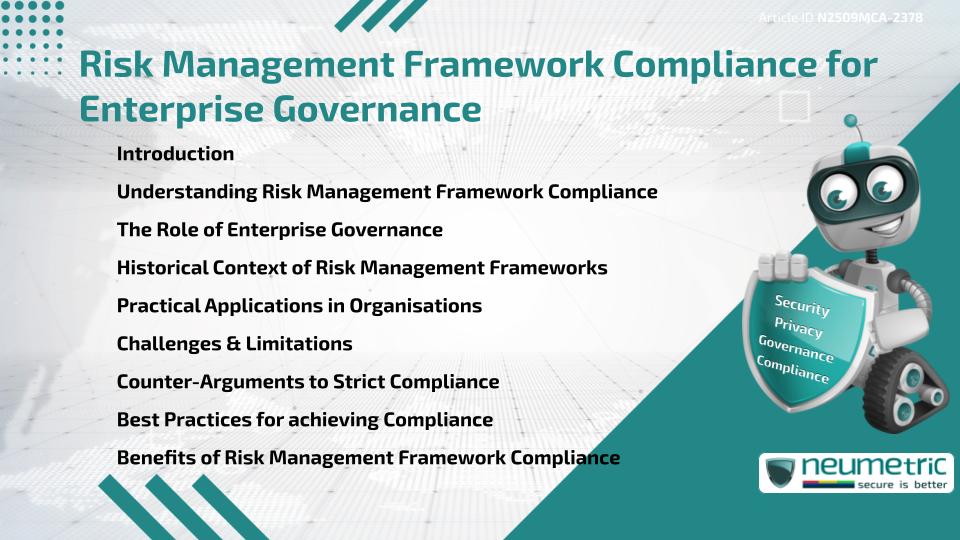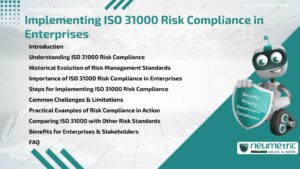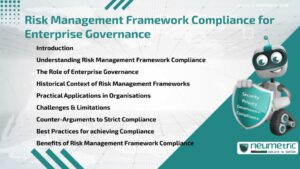Table of Contents
ToggleIntroduction
Risk Management Framework compliance is a critical element in enterprise Governance. It ensures that Organisations can identify, assess & mitigate Risks while adhering to regulatory & Industry Standards. By embedding compliance into Governance practices, companies can strengthen decision-making, maintain accountability & protect Stakeholder interests. This article explores the meaning, history, challenges & practical applications of Risk Management Framework compliance, offering balanced perspectives & actionable insights.
Understanding Risk Management Framework Compliance
Risk Management Framework compliance refers to an Organisation’s adherence to structured guidelines for managing Risks. These frameworks, such as NIST RMF, provide standardised processes to evaluate Threats & implement safeguards. Compliance ensures that Organisations not only protect assets but also meet legal & regulatory obligations. It is a cornerstone for enterprises that aim to balance operational efficiency with accountability.
The Role of Enterprise Governance
Enterprise Governance is the system by which Organisations are directed & controlled. It emphasizes accountability, transparency & ethical leadership. Risk Management Framework compliance strengthens Governance by aligning Risk strategies with organizational goals. For example, compliance ensures that Risk Management is not merely a technical task but a core part of leadership & oversight.
Historical Context of Risk Management Frameworks
The roots of Risk Management frameworks can be traced back to Financial regulations in the early twentieth century. Over time, frameworks expanded into areas like Information Security, operational continuity & environmental standards. Key milestones, such as the development of ISO 31000, have shaped modern compliance practices. These historical shifts reflect society’s increasing demand for accountability & resilience in business.
Practical Applications in Organisations
Organisations apply Risk Management Framework compliance in various ways. In banking, compliance ensures that institutions meet Basel Committee standards to reduce Financial Risk. In Healthcare, compliance frameworks safeguard Patient Data under HIPAA. Manufacturing firms use compliance to manage supply chain Vulnerabilities. In all cases, compliance bridges regulatory requirements with practical Risk Mitigation strategies.
Challenges & Limitations
Despite its benefits, Risk Management Framework compliance is not without challenges. Implementing frameworks can be costly, requiring investments in training, technology & auditing. Additionally, compliance may slow down innovation, as strict guidelines sometimes conflict with agile decision-making. Smaller Organisations often struggle with resource constraints that limit their ability to achieve full compliance.
Counter-Arguments to Strict Compliance
Some critics argue that strict Risk Management Framework compliance can create a check-box mentality. Instead of focusing on actual Risk reduction, Organisations may prioritise passing audits. This approach can lead to inefficiencies & blind spots, especially when compliance becomes detached from real-world Risks. Therefore, flexibility & adaptability are crucial alongside formal compliance.
Best Practices for achieving Compliance
To effectively integrate Risk Management Framework compliance into enterprise Governance, Organisations can adopt Best Practices:
- Regular training & awareness for Employees
- Continuous Monitoring & reporting of Risks
- Use of technology tools for automation & analysis
- Clear communication between leadership & operational teams
- Periodic audits to validate & improve compliance efforts
These practices help Organisations move beyond minimal requirements & embed Risk awareness into their culture.
Benefits of Risk Management Framework Compliance
When done effectively, Risk Management Framework compliance provides significant advantages. It enhances organizational resilience, builds Stakeholder trust & reduces the Likelihood of costly disruptions. Moreover, compliance can serve as a competitive advantage by demonstrating reliability & accountability to clients & regulators.
Takeaways
- Risk Management Framework compliance is central to enterprise Governance.
- It balances accountability, regulatory adherence & operational resilience.
- While it presents challenges, Best Practices can ease integration.
- Compliance offers both protective & competitive benefits for Organisations.
FAQ
What is Risk Management Framework compliance?
Risk Management Framework compliance refers to an Organisation’s adherence to structured guidelines designed to identify, assess & mitigate Risks while meeting Regulatory Standards.
Why is compliance important for enterprise Governance?
Compliance ensures accountability, transparency & ethical leadership, which strengthens enterprise Governance & builds Stakeholder trust.
Which frameworks are most commonly used?
Common frameworks include NIST RMF, ISO 31000 & Basel standards, each addressing different aspects of Risk Management.
What challenges do Organisations face with compliance?
Challenges include high costs, resource constraints, potential slowdown of innovation & a tendency toward check-box approaches.
How does compliance benefit Organisations?
Challenges include high costs, resource constraints, potential slowdown of innovation & a tendency toward check-box approaches.
Can compliance hinder innovation?
Yes, strict compliance can slow decision-making & innovation if not balanced with flexibility & adaptability.
What are Best Practices for achieving compliance?
Best Practices include regular training, Continuous Monitoring, use of technology, clear communication & periodic audits.
Need help for Security, Privacy, Governance & VAPT?
Neumetric provides organisations the necessary help to achieve their Cybersecurity, Compliance, Governance, Privacy, Certifications & Pentesting needs.
Organisations & Businesses, specifically those which provide SaaS & AI Solutions in the Fintech, BFSI & other regulated sectors, usually need a Cybersecurity Partner for meeting & maintaining the ongoing Security & Privacy needs & requirements of their Enterprise Clients & Privacy conscious Customers.
SOC 2, ISO 27001, ISO 42001, NIST, HIPAA, HECVAT, EU GDPR are some of the Frameworks that are served by Fusion – a SaaS, multimodular, multitenant, centralised, automated, Cybersecurity & Compliance Management system.
Neumetric also provides Expert Services for technical security which covers VAPT for Web Applications, APIs, iOS & Android Mobile Apps, Security Testing for AWS & other Cloud Environments & Cloud Infrastructure & other similar scopes.
Reach out to us by Email or filling out the Contact Form…





